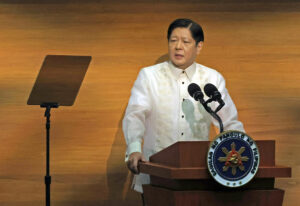By all conventional indicators, Bangladesh is facing serious macroeconomic distress, as the International Monetary Fund (IMF) recently noted.
Inflation remains stubbornly high. The taka has depreciated significantly. Banks are undercapitalized, and non-performing loans have surged. At the same time, public trust in core institutions is sinking, nowhere more so than regarding the judiciary and financial enforcement bodies.
The IMF, currently reviewing the fifth tranche of its 5.5 billion USD loan package to Bangladesh, has acknowledged these risks in unusually cautious language. In a statement released on November 13th, mission head Chris Papageorgiou praised the government’s monetary tightening and efforts to restore foreign reserves, but added a clear warning: “downside risks remain significant, particularly if policy responses are delayed or inadequate.”
That line carries particular weight. Concretely, the IMF is signaling not only concern over Bangladesh’s fiscal and monetary health, but also over its institutional capacity to deliver and sustain reform. This concern should spark a broader conversation about how global lenders approach countries with a weakened rule of law, and whether conditionality frameworks are keeping pace with the political realities in many borrowing countries.
Institutional weakness is not just about inefficiency
International financial institutions have long focused on technical metrics: inflation targets, debt-to-GDP ratios, interest rate regimes. That being said, technical factors cannot be divorced from the institutional environment in which policy is made and enforced. When regulators are politically captured, when the judiciary lacks independence, and when enforcement becomes arbitrary, even well-designed programmes can unravel.
This is increasingly evident in Bangladesh. The IMF itself highlighted the urgent need for reform in the banking sector, noting in its statement that “financial sector reforms are critical to address banking sector challenges.” The Asset Quality Reviews (AQRs) launched by the Bangladesh Bank have revealed deep undercapitalization in Shariah-based banks, but they seem only to scratch the surface. According to the IMF, the reviews must now extend to all systemically important and state-owned banks, many of which remain opaque and politically exposed.
At the heart of the problem is the politicization of core financial decisions. From interest rate setting to exchange rate management, policy choices increasingly reflect short-term political priorities rather than long-term economic fundamentals. This erosion of technocratic independence has weakened investor confidence and left the central bank unable to act swiftly or credibly in response to inflation, currency instability, or financial sector distress.
These are not peripheral issues. The IMF has urged Bangladesh to make monetary policy more effective by fully implementing its new exchange rate regime and phasing out quasi-fiscal operations. Without a credible and impartial central bank, policy commitments will lack credibility. Monetary tightening becomes performative rather than impactful. Exchange rate flexibility becomes rhetorical rather than concrete, and confidence, both domestic and foreign, evaporates.
Rule of law and the problem of selective enforcement
Beyond the banking sector, there is a deeper structural concern – the arbitrary and politicized use of state authority to settle scores, reward allies, as well as punish rivals. Legal processes are frequently seen as tools of political convenience rather than neutral mechanisms of justice. Companies and individuals find themselves subject to retroactive asset seizures, selective tax audits, or sudden regulatory action, all, unsurprisingly, depending on their political alignment.
This climate of selective enforcement undermines the very premise of development lending. IMF support, particularly under programmes like the Extended Credit Facility (ECF), depends on agreed policy conditions being met in good faith. It is worth asking how reforms can be implemented or sustained if legal institutions are unreliable and enforcement is politicized.
For the private sector, the implications are stark. Investors hesitate to commit capital when property rights can be reversed overnight. Entrepreneurs are less likely to innovate or expand if they fear regulatory harassment. And when foreign companies seek redress, they often find the domestic legal system unwilling or unable to act impartially.
Lessons from other jurisdictions
Bangladesh is not the only country where rule-of-law failings have jeopardized economic progress. In Tunisia, for example, the judiciary has come under increasing political pressure, raising concerns about the country’s eligibility for future EU support. In Lebanon, the banking sector collapse was worsened by years of lax regulation and cronyism, compounded by a weak and compromised legal system. In both cases, economic recovery has stalled not because of external shocks alone, but also because of domestic institutional decay.
Even in middle-income countries like Turkey or Egypt, lenders have grown more cautious. IMF programmes have faced credibility gaps where fiscal reforms were promised but then diluted or reversed due to political pressure. In response, some institutions have begun to adapt. The European Bank for Reconstruction and Development (EBRD), for instance, now includes governance and rule-of-law assessments in its country strategies, explicitly linking financing to institutional reform benchmarks.
The IMF, too, has tools at its disposal. It can structure disbursements around measurable governance milestones. It can support judicial reform projects in parallel to economic programmes. And it can work with other institutions, such as the World Bank or UNDP, to help build legal infrastructure capable of supporting long-term stability.
Most importantly, it can refuse to disburse funds when the institutional environment is deteriorating. This should not be seen as a form of punishment, but rather a form of prudence that it can exercise. Lending without guardrails risks enabling exactly the kind of behavior that undermines economic credibility.
A turning point for conditionality ?
Bangladesh may soon become a test case for these evolving standards. As the IMF weighs whether to release the next tranche of its loan, it faces a choice. Releasing funds without stronger commitments to institutional reform could send the wrong signal, not only to Dhaka but to other countries watching closely. However, insisting on credible improvements to judicial independence, regulatory transparency, and central bank autonomy would strengthen the message that macroeconomic stability cannot be achieved without the rule of law.
The IMF is not a political actor. But it is, unavoidably, an institutional one. Its credibility depends on its ability to enforce its own standards, especially in challenging political environments. In Bangladesh, that means confronting the institutional rot that threatens to undo technical progress. It also means being able to say no when the foundations of reform are not present.
Ultimately, no economy can thrive when laws are selectively enforced, regulators are politically captured, and courts answer to power rather than principle.


















